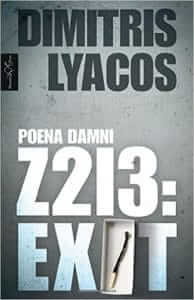By Nicholas Alexander Hayes
 The beauty of a fragment is its transience. It is a tatter of what has been forgotten. The poetry of Sappho is beautiful (at least in the translations I have read.) But what has always struck me more is the poignant absence of the rest of the work. Knowing that she is the tenth muse is one thing, but fully understanding why will always be outside of our understanding because of the fragmentary nature of what remains. The Modern, Post-Modern, Contemporary gesture of fragmentary prose contains the same power. The brilliance of the text must be counterpointed with the brilliance of what the reader can never know. The subjectivity and the leaps that we have to make over the chasms of unknowing can be exhilarating.
The beauty of a fragment is its transience. It is a tatter of what has been forgotten. The poetry of Sappho is beautiful (at least in the translations I have read.) But what has always struck me more is the poignant absence of the rest of the work. Knowing that she is the tenth muse is one thing, but fully understanding why will always be outside of our understanding because of the fragmentary nature of what remains. The Modern, Post-Modern, Contemporary gesture of fragmentary prose contains the same power. The brilliance of the text must be counterpointed with the brilliance of what the reader can never know. The subjectivity and the leaps that we have to make over the chasms of unknowing can be exhilarating.
Blanchot’s powerful and fragmentary contemplation Writing of the Disaster leaves me dumb and dumbfounded as I wander in a text of light and shadow, shapes and voids. Dimitris Lyacos makes admirable additions to such fragmentary writing. If an experimental book can be grounded, Z213: Exit is more so than Samuel Becket’s How It is. Yet Lyacos’s novels echoes the muddy struggle and journey with and without Pim. Lyacos traps us in the tumult of a conflict which like disaster comes upon us and does not come. It is a world of decay and ruin but one that cannot release anxiety of being. In Lyacos’s world, it is easy for the reader to want release although such a release would be obliteration (which originally carried the meaning of striking out text.)
At times, the fragments break against a more sensitive note as the narrator visits a brothel. Despite the Bataillean erotics and violence to which fragments lend themselves, the scenes do not reflect an embrace of destruction. They possess touching awkward and distant expressions of human impulse. Such a sensitivity does not relieve the general abjection the narrator leads us to. What is witnessed, read and written becomes corrosive at times. The structure breaks down and we are left with something that is more gesturally poetic than prosaic.
I move myself very carefully on the ice that separates appreciation and appropriation when I say that at times the beauty of Lyacos resembles something akin to the Japanese idea of sabi, and its idea of beauty and imperfection through age and use. Yet I recognize that Lyacos speaks from a profoundly European frame and it is hard for me not to see the imprint World Wars and regional conflicts imprinted in the stories and muddy environment.
Z213: Exit (Poena Damni)
Dimitris Lyacos
Shoestring Press
ISBN: 978-1-910323625









